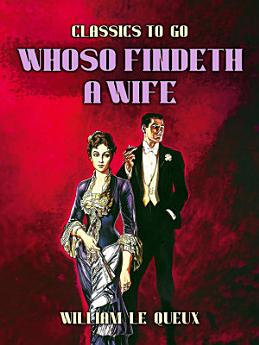Whoso Findeth a Wife
juli 2023 · Otbebookpublishing
E-bok
244
Sidor
family_home
Kvalificerad
info
reportBetyg och recensioner verifieras inte Läs mer
Om den här e-boken
Excerpt: ""Whoso findeth a wife findeth a good thing, and obtaineth favour of the Lord."—Proverbs xviii, 22. "Have those urgent dispatches come in from Berlin, Deedes?" "Captain Hammerton has not yet arrived," I answered. "Eleven o'clock! Tut, tut! Every moment's delay means greater risk," and the Earl of Warnham, Her Majesty's Principal Secretary of State for Foreign Affairs, strode up and down his private room, with his hat still on, impatiently snapping his bony fingers in agitation quite unusual to him. "Hammerton wired from Berlin yesterday, when on the point of leaving," I observed, taking a telegram from the table before me. "In cipher?" "Yes." "No accident is reported in the papers, I suppose?" "Nothing in the Times," I replied. "Strange, very strange, that he should be so long overdue," the Earl said, at last casting himself into his padded chair, and lounging back, his hands thrust deep into his pockets as he stared thoughtfully into space."
Om författaren
William Le Queux (1864-1927) was a British author, journalist, and adventurer whose prolific output and sensational storytelling left an indelible mark on early 20th-century literature. Born in London to a French father and an English mother, Le Queux's cosmopolitan upbringing and insatiable curiosity fueled his writing career. His works often blurred the lines between fiction and reality, captivating readers with tales of espionage, international intrigue, and looming threats of war.Le Queux's most notable contribution to literature is his pioneering role in the spy novel genre. His vivid imagination and knack for weaving intricate plots predated and influenced the likes of John Buchan and Ian Fleming. His works, such as "The Great War in England in 1897" and "The Invasion of 1910," played on contemporary fears of foreign invasion, reflecting and shaping public sentiment during a time of geopolitical tension.A master of self-promotion, Le Queux often claimed to have inside knowledge of government secrets and espionage activities, a tactic that both intrigued and alarmed his readers. His controversial assertions and the sensational nature of his writing sometimes drew skepticism and criticism, but they also ensured his lasting popularity.Le Queux was not just a writer of fiction; he was also a fervent patriot and an early advocate for national preparedness. His works often carried a didactic tone, urging vigilance and readiness in the face of potential threats. This blend of entertainment and advocacy made his novels more than just thrilling reads; they were calls to action that resonated with a generation on the brink of global conflict.In an era where the boundaries between fact and fiction were increasingly porous, William Le Queux stood out as a figure who deftly navigated both realms, leaving a legacy that continues to influence the spy genre and the way we think about national security.
Betygsätt e-boken
Berätta vad du tycker.
Läsinformation
Smartphones och surfplattor
Installera appen Google Play Böcker för Android och iPad/iPhone. Appen synkroniseras automatiskt med ditt konto så att du kan läsa online eller offline var du än befinner dig.
Laptops och stationära datorer
Du kan lyssna på ljudböcker som du har köpt på Google Play via webbläsaren på datorn.
Läsplattor och andra enheter
Om du vill läsa boken på enheter med e-bläck, till exempel Kobo-läsplattor, måste du ladda ned en fil och överföra den till enheten. Följ anvisningarna i hjälpcentret om du vill överföra filerna till en kompatibel läsplatta.








